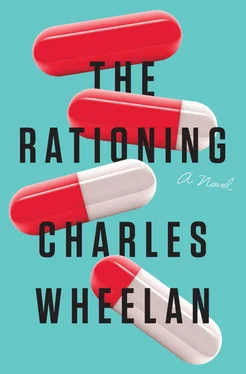The President said loudly, “Why does she have a statement out before we do?” The room was silent. “Put out a fucking statement! We are already twenty feet underwater on this.”
“We are going to have a comprehensive statement out in the next ten minutes,” the Chief of Staff assured him.
“We don’t need a dissertation,” the President snapped. “We just need to get some facts out there so we don’t leave a vacuum for all this crap.”
In the brief silence that followed, the Communications Director’s phone chirped lightly. He looked at the screen, read for a moment, and then hurled the phone across the room at the opposite wall. It splintered into several pieces, one of which bounced back onto the conference table, settling in front of the Secretary of Defense. As the others in the room stared at the shattered cell phone, the Communications Director said, “The satellite uplink isn’t working. We can’t send video from the plane.”
“Can we fix it?” the Chief of Staff asked.
“I don’t know,” the Communications Director answered.
The President said, “I need to be on television. I need to address the country.”
“We can do radio,” the Chief of Staff offered.
“I’m not fucking FDR,” the President snapped.
“The safest option is to get you on the ground in Hawaii,” the Communications Director offered. “That would be about an hour shorter.”
“Or we could fix the uplink,” the Chief of Staff said.
“Who?” the President challenged. “Who on this plane knows how to fix a satellite uplink?”
“Then we need to go to Hawaii,” the Chief of Staff said. “Right? That gets us on the ground an hour earlier.” The President nodded assent. For the second time in half an hour, Air Force One made an aggressive 180-degree turn. And for the second time, the Captain did not ask why. In the back of the plane, the press corps did wonder why the plane was once again making a U-turn. Unfortunately—and arguably unfairly—the metaphor for the White House response was born: Air Force One flying in circles over the Pacific.
TWO BLOCKS BEFORE THE MARRIOTT, WHEN I COULD SEE THE bright lights illuminating the circular driveway in front of the hotel, I looked back over my shoulder and spotted headlights coming toward me. I could see the bright taxi light as the car drew closer. I stepped aggressively into the street to hail the cab. By this point I was damp from the mist, not soaked, but also sweating despite the cool early morning. I reached for the back door of the taxi and pulled the handle; it was locked. I instinctively looked to the driver’s window, which buzzed down about halfway. The driver was an enormous black man with short salt-and-pepper hair. He stared out the window, locking eyes with me but not saying anything. I had never hailed a cab in D.C. at four-thirty in the morning. I suppose it makes sense that a sensible driver does not let just anyone jump in the back. “I need to go to the White House,” I said. The driver cocked his head slightly, still saying nothing. “It’s really important,” I added.
“Have you been drinking?” he asked without irony. I presume he could tell from looking at me that I was not going to stick a gun in the back of his head, but it was entirely plausible that I had been drinking all night and might vomit in the back of his cab. I fished into my pocket and pulled out my White House badge. I held it up in front of the window.
“It’s important,” I repeated.
“Okay, get in.” I heard the locks pop.
The cab dropped me at the northwest gate, where I usually entered, but I did not recognize the guard. Nor did I recognize the woman sitting in the lighted booth behind him. I flashed my visitor badge. “Who are you here to see?” the guard asked.
“I’m not sure,” I said.
“Your name is not in the visitors log,” he said.
“It’s an emergency.”
“Someone still has to sign you in.”
“Okay, hold on.” I dialed the Chief of Staff, but there was no answer. I texted her: “Someone has to sign me in to the White House.” The rain began to fall a little harder, and I moved under the eaves of the guardhouse. I dialed the Communications Director, unaware that his phone was strewn in pieces around the conference room of Air Force One. No answer. I turned back to the guard. “Who’s inside already?” I asked. “Who can sign me in?”
“I can’t tell you that.” His tone suggested I should know as much, and he grew more suspicious just for the asking. My secure phone buzzed; caller ID showed it was the Chief of Staff. “I’m at the White House but I can’t get in,” I said.
“There has been a change of plans,” she explained. “We don’t want you to look political. You’re supposed to be the voice of science. We want to put you on camera somewhere else—not the White House.”
“My cab just left. I’m standing outside in the rain.”
“You’ll need a car.”
“Where am I going?”
“We don’t know yet. Does the NIH have TV facilities?” the Chief of Staff asked.
“Maybe, but there won’t be anyone there to run the equipment,” I said.
“Just stay there,” she said, hanging up. No one said hello or goodbye that day. After about five minutes a young woman in blue jeans and a sweatshirt came walking briskly down the path from the West Wing, two pieces of paper flapping in her hand. She opened the gate from the inside and thrust the papers toward me. “We just issued this release,” she said. I looked at her quizzically. She continued, “I’m the Assistant to the Deputy Communications Director. We listed you as the scientific contact on the release. Reporters are going to start calling, so you need to think about what you are going to say.”
I held up my secure phone. “On this number?”
“No, on your cell phone.”
“I left my cell phone at home,” I said.
“Fuck.” She exhaled audibly. I began to read the release. The first paragraph explained that the Capellaviridae virus was a common virus that had recently proven dangerous to humans. The statement declared in bold letters: “ There has been no terrorist attack. Capellaviridae is a common virus found in nearly all American households.”
The second paragraph explained that the White House was going to “extraordinary measures” to procure sufficient doses of Dormigen to deal with the virus threat. Near the bottom of the page, the release explained that Capellaviridae was “spread by the bite of a common dust mite found in most—” I stopped reading. “We can’t say ‘spread.’ You’ve got to redo this.”
“It’s gone out,” she said, mildly annoyed, as if I did not appreciate the magnitude of what was going on. “I was told to get something out immediately.”
“We can’t say ‘spread,’” I repeated. “We cannot have people thinking that they’re going to catch this thing. It’s not contagious… You’re either going to get it, or you’re not. We can’t—”
“I can do an update. What am I supposed to say?” she asked.
“I don’t have my phone, so you need to change the contact number anyway.”
“Fine. Tell me what to write.”
“Just say…” I was thinking as I spoke, but not fast enough. “Say it’s not contagious,” I instructed. “Leave the dust mite out. Just tell people… say it’s not contagious. Say that nearly all Americans are infected by—no, don’t say ‘infected.’ Say that many Americans are hosts to Capellaviridae , and in the vast majority of cases, the virus is benign.” She was just staring at me. “Write this down,” I said sharply. Neither she nor I had a pen. As I patted my jacket pockets, the guard, who had been standing near us the whole time, offered a ballpoint. I continued, “Say that we are—that scientists, the nation’s top scientists, are working around the clock to determine why Capellaviridae turns virulent—”
Читать дальше












